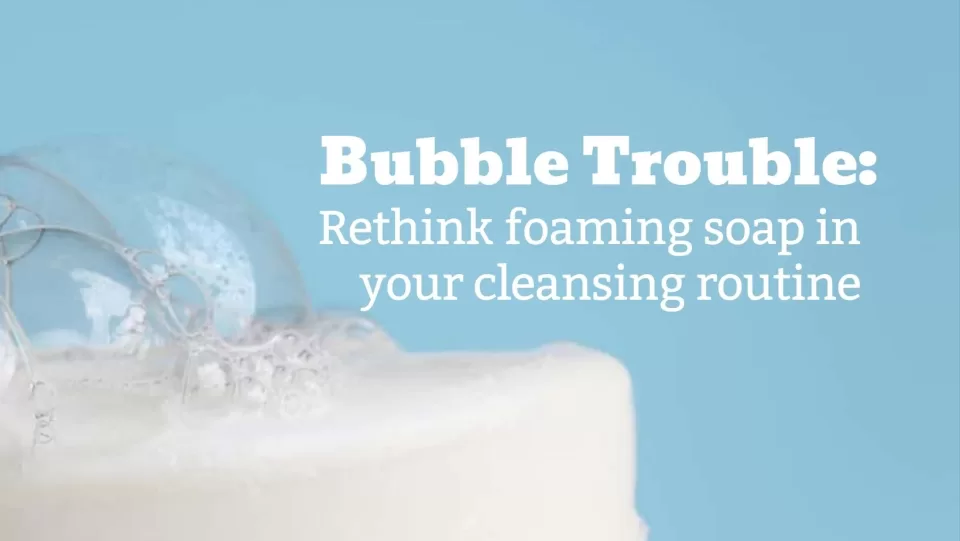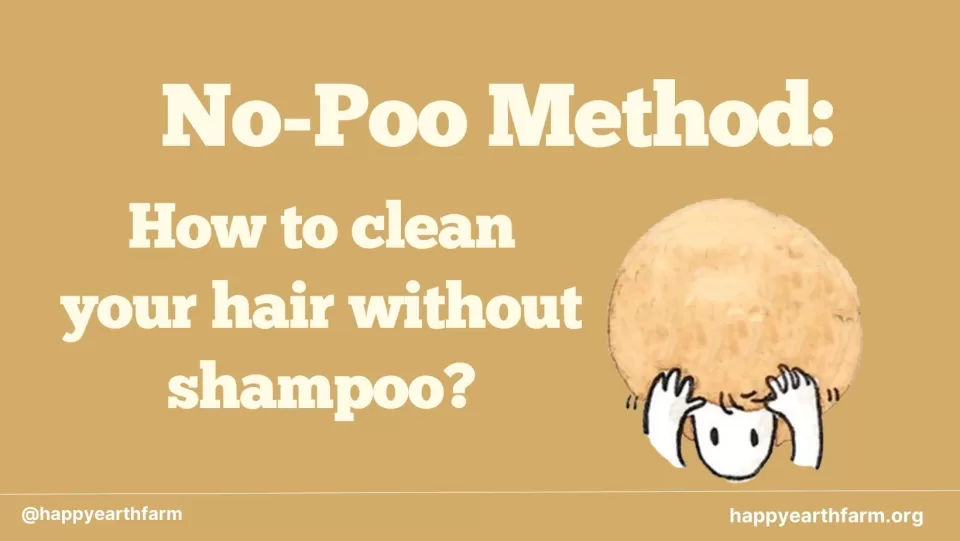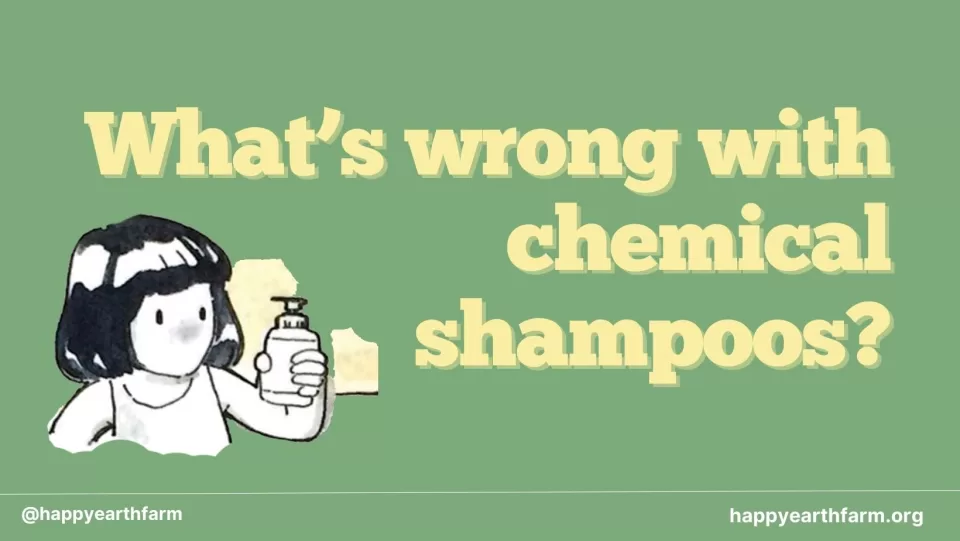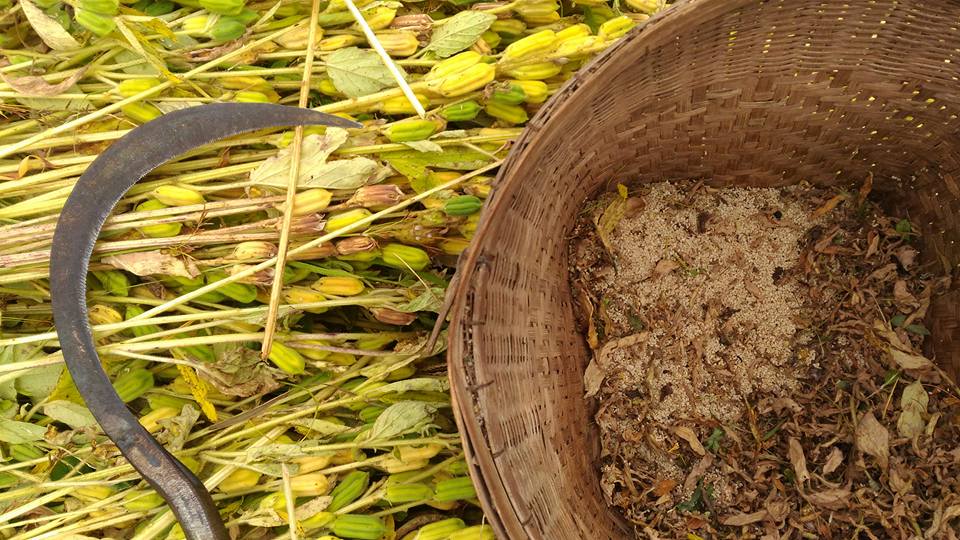
What We Grow: Sesame
July 14, 2020
How embracing my curls reconnects me to Mother Nature: An interview with Sakshi from @curlyandkind
August 5, 2020How often should I wash my oily hair and why should I learn to love my sebum?
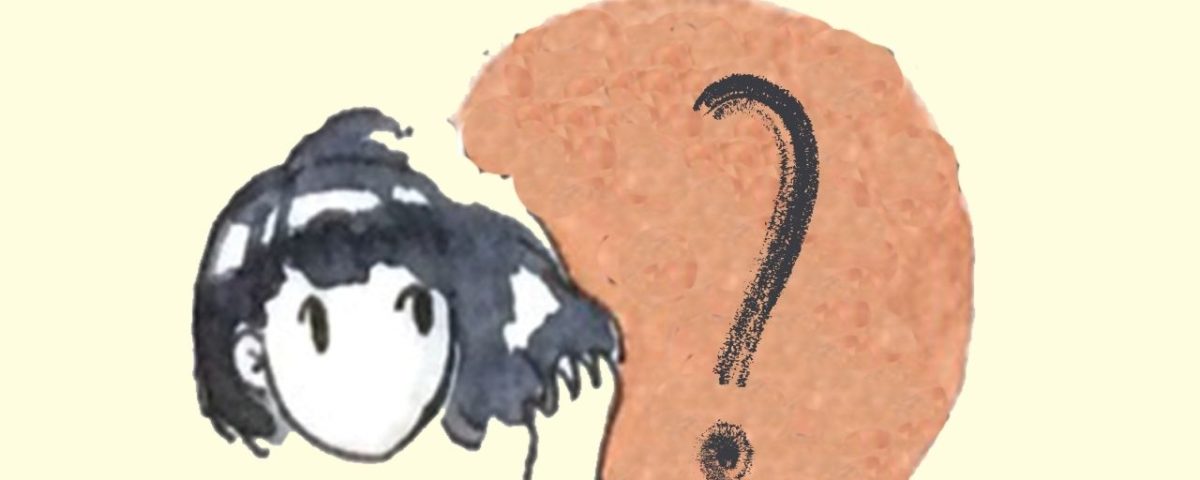
Is there something wrong with washing my hair daily? Would my hair turn too oily if unwashed? What’s wrong with my shampoo? And how often should I wash my hair actually?
With so many myths about hair washing and hair health, we are here to tell you why we don’t think shampooing your oily hair too often is a good idea and why you should change your hair cleansing routine now.
If you have greasy hair and tend to wash your hair daily, you may be surprised to learn that your chemical shampoo is not the solution for your oily hair and scalp. On the contrary, you might be locked into a vicious cycle of shampoo dependency in which your sebum production is deregulated, leading to more greasy hair. What probably ends happening next is you feel like you need to rush to your favorite shampoo to get rid of the excess oil as fast as you can!
But before showing you what is wrong with chemical shampoos, let’s first take a mini Hair 101 course to learn more about hair biology.
Hair has various functions such as protecting us against external factors, producing sebum and pheromones, and regulating body temperature. It is made up of two parts: the hair shaft and the hair follicles. What we consider a hair shaft is basically a dead cell that is made up of Keratin protein.
We can divide the hair shaft into three layers:
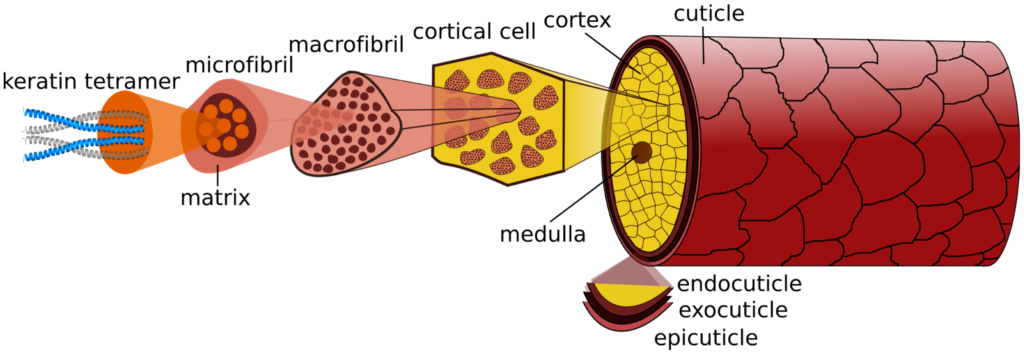
■ The cuticle layer has scale-like structures that cover the hair’s surface. It protects the hair strand as well as makes your hair shine.
■ The cortex lies beneath the cuticle layer and contains hair pigments that provide the hair its color.
■ The medulla is the layer running through the center of the hair strand.
At the root of the hair shafts are hair follicles whose main function is to grow hair. Hair follicles are attached to the hair papilla, a small capillary that transports nutrients needed for hair growth. Hair health is mostly determined by healthy hair follicles.
Closer to the hair shaft is a sebaceous gland. Its primary function is to produce sebum, an oily, waxy substance that coats, moisturizes, and protects your hair and skin. Furthermore, this protective natural oil also possesses anti-bacterial anti-inflammatory properties. It can help speed up wound healing as well as regulate the microbes on the skin and scalp.
Many factors, such as genetics, hormonal fluctuation, or age, are involved in sebum production. Some research also found that in psoriasis patients, the number of sebaceous glands presented in the dermis is greatly reduced causing dry, scaly skin. This shows how important sebum is.
Despite its multiple benefits, the overproduction of sebum signals some underlying issues. Given the fact that sebum is secreted to protect our skin and scalp from inflammation, the question is, under what circumstances would the body oversecrete it? Is the body trying to protect us from something? The answer lies in the chemical shampoos that we use.
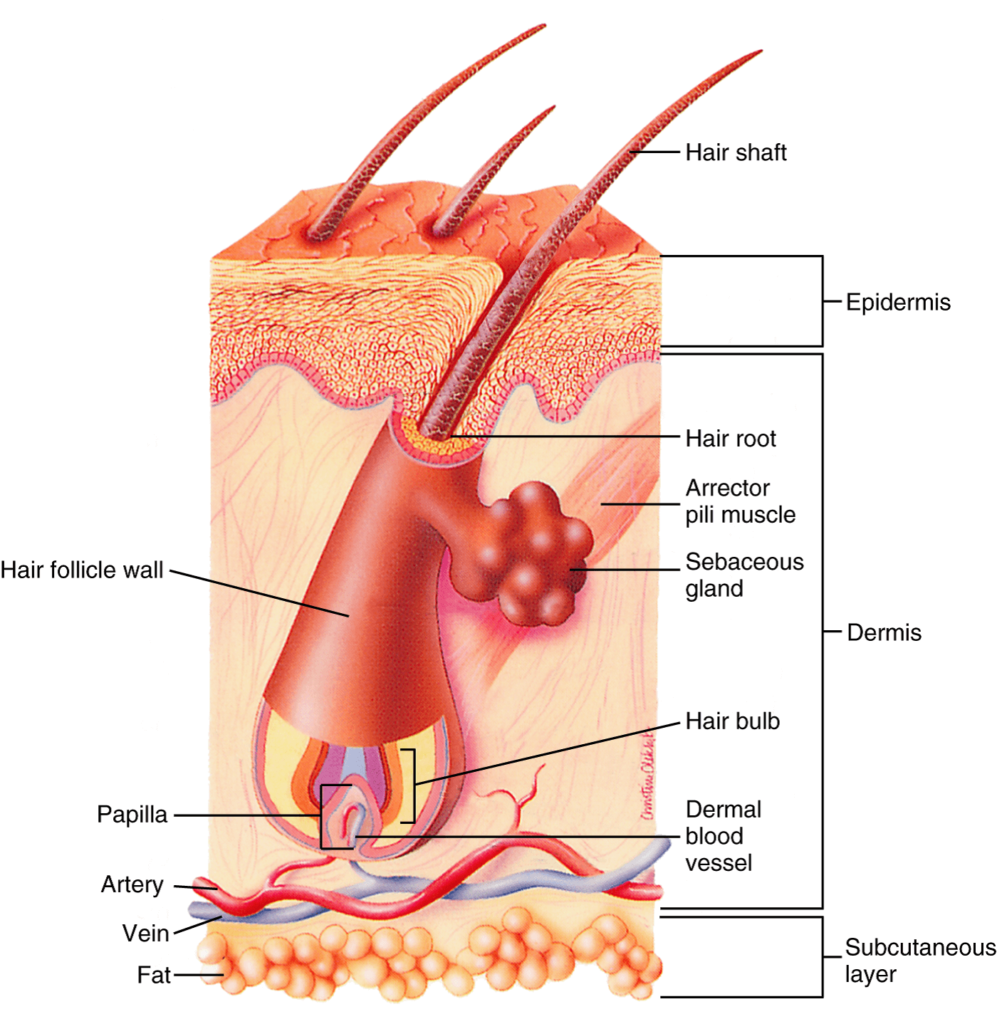
Commercial shampoos available in the market contain several harmful ingredients, ranging from surfactants, platelets, parabens, synthetic fragrance, or silicone. Several of these ingredients are even carcinogenic. They are meant to clean your hair by stripping the natural oils of your hair and scalp. As a result, you feel squeaky clean after wash. Unfortunately, this ultra-clean sensation comes with a price.
The truth is, chemical shampoos disrupt the body’s natural mechanism to secrete sebum. For most people, especially those with sensitive skin and scalp, after shampooing, the hair and scalp can become dry and irritated. What does the body do to help rebalance the dry scalp and hair then? It compensates for the dryness by producing more oil. The more irritated the scalp, the more oil is produced. Due to this overcompensation, your hair and scalp get oily by the end of the day. This leads you to feel the need to shampoo your hair again soon.
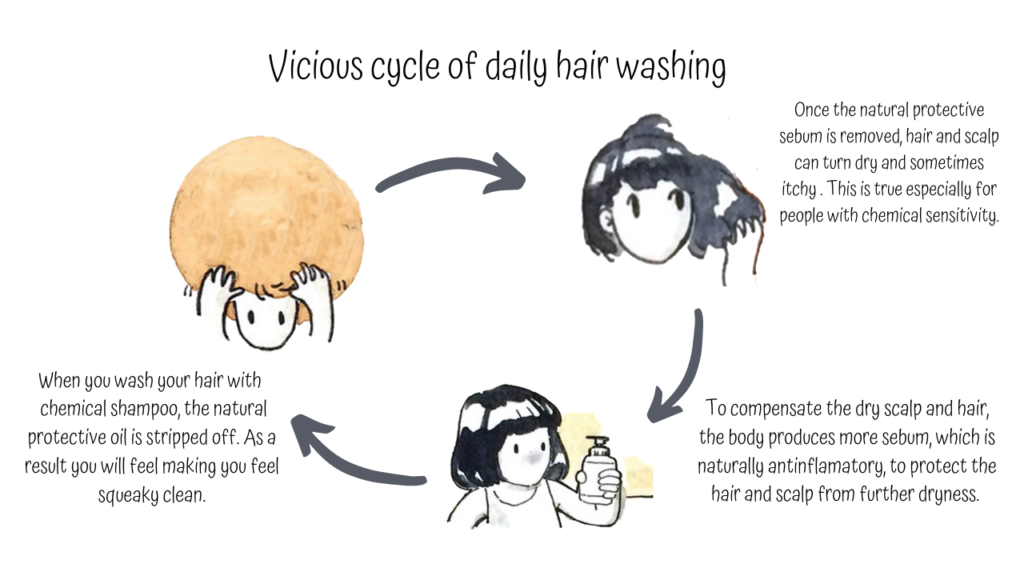
Unless you do something to break this vicious cycle, it will continue. The longer you ignore the signs, the worse your hair can become. Many people experience chronic itchy, dry, and flaky scalp. Others start to lose hair or have gray hair at an early age.
Now, you may ask what you can do to break this vicious cycle and get out of this shampoo dependency? Here are a few things you can try:
- Wash your hair less frequently. Instead of washing your hair daily, you can space it out to wash it on alternate days. And eventually, you can work towards washing it once or twice a week.
- Instead of using chemical shampoos, you can follow the No-Poo method which involves using a mild natural cleanser like rice powder, mung bean powder, lime juice, or even our No-Poo Head to Toe Wash, or just plain water and rise water to wash your hair. It can be a bit hard when you first start out. But over time, after the transition period is over, your sebum production will be better regulated and your scalp won’t feel too oily anymore. In a way, you become more used to your natural hair!
- If you do not have time to wash your hair or feel that it is too greasy, try using dry shampoo. Sprinkle dry shampoo powder over your hair, focusing mainly on your roots, and give it a little shake. It can help absorb excess oil in no time.
- Brush your hair to distribute sebum from the root evenly along the hair shaft. This is especially important for anyone with dry hair or curly hair because it means the portions of your hair shafts further from the root do not have enough oil coverage. And don’t forget to wash your comb or brush from time to time too!
- Avoid washing your hair with hot water. A hot shower can dry out your scalp and cause oil compensation. Instead, washing your hair with cold or room temperature water can help close your cuticles and prevent sebaceous glands from going into overdrive.
- Avoid blow-drying your hair with heat. Heat can penetrate into your hair and scalp and further cause scalp dryness. Try to air-dry your hair at room temperature or with a fan instead.
We hope that we have shared some useful information and have busted a few myths out there about hair washing and shampoo. Maybe the real issue is not only about your sebum overcompensation, but it is also about your perception of beauty. Different media try to set a beauty benchmark for us to reach. Many people try so hard to be beautiful although it could harm ourselves in the end.
Beauty is in the eye of the beholder and it is different from one person to another. Only you can tell what beauty means for yourself. Is it worthwhile to sacrifice your health for the notion of beauty sold in shampoo commercials?
Maybe it is time to learn to embrace your wholeness, the good the bad and the ugly, and don’t forget to give some love to your sebum too!


